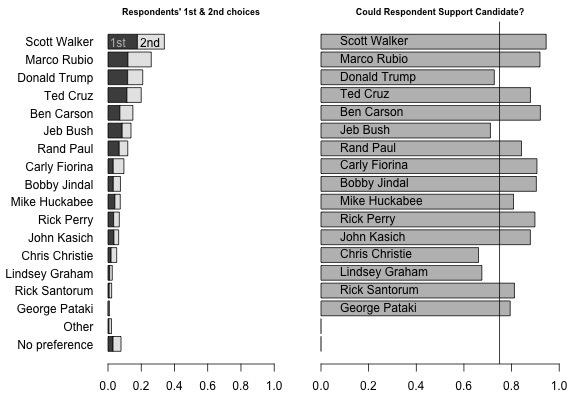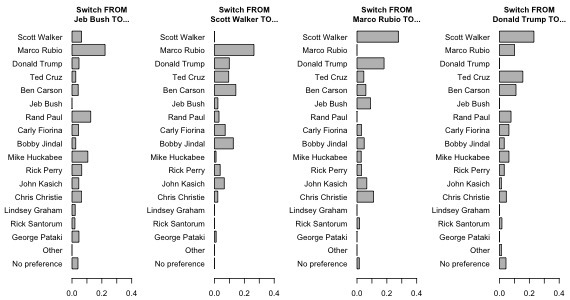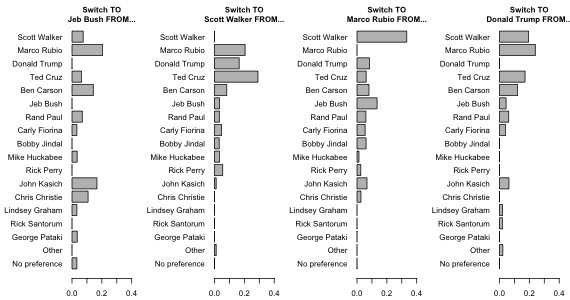The focus of the primaries is on rank-and-file voters, but political elites have more influence than is often appreciated. This is the argument of The Party Decides, a book I co-wrote with Marty Cohen, David Karol and John Zaller on presidential nominations. It is also the reasoning behind the Huffington Post's surveys of political activists last week.
The political activists those surveys captured are not quite the political elites whose endorsement we analyzed in the book, but the spirit is the same. I suspect that this sample is actually much more ideologically extreme and less willing to compromise than the elites who matter are. It's likely that, as in many years past, there will be a conflict between the more ideologically pure parts of the party and the more professional compromisers. These respondents are probably more purist than professional. But it's a step in the right direction.
What's more, the HuffPo survey didn't just ask who respondents liked. It asked their second choices, as well as whether each candidate were acceptable to the respondent or not. This is also part of our argument. The ideal candidate is not necessarily anyone's first choice, but someone acceptable to all factions in the party. Now we have a direct measure of that. (Asking these questions is a smart move, one I discuss at greater length here at Mischiefs of Faction.)
As Mark Blumenthal and Ariel Edwards-Levy reported last week, Walker and Rubio are runaway winners when you add their first- and second-choice votes. They also dominate when you ask if there are any candidates that you could not in any way support. Jeb Bush, Donald Trump, Chris Christie and Lindsey Graham all fall below 75 percent acceptable, as you can see in this figure. If you think (as I do) that Bush supporters are underrepresented in this ideological activist sample, you might conclude that this is mainly a contest between Bush, Walker and Rubio, with several others having some significant support.
Since what matters is who can build a large enough coalition, rather than who is necessarily in first place in this poll, I was interested in where each candidate's second-choice support was coming from, and I asked for the data.
There is some evidence for a factional fight between ideological purists and more cautious pragmatists in the following figures. The first shows where each candidate's second-choice support is coming from. The second figure shows where each candidate's first choice supporters went.
I interpret these figures as suggesting:
1. Bush is the candidate of moderates and those who like established politicians. He draws from Kasich and Christie, as well as Rubio (more on him in a second). People who like Bush like a lot of different candidates second, but Rubio dominates.
2. Walker is the candidate of the ideological purists. He and Rubio have a lot of overlap, but he also draws from Cruz and Trump.
3. Rubio seems to bridge these two camps. He has more overlap with Bush, Kasich and Christie than Walker does, but he overlaps with Walker and Trump a lot too.
4. Trump is the 2nd choice candidate of far fewer people, but his profile looks like Walker's, with overlap with Walker, Rubio, Cruz and Ben Carson.
This sample represents the views of only one set of players. Established politicians will have more clout, and rank-and-file voters will make the actual decisions. But activists are where a lot of the action in the party is, and these activists tell a story of a factional fight between Bush and Walker, with Rubio possibly appealing to both sides.


